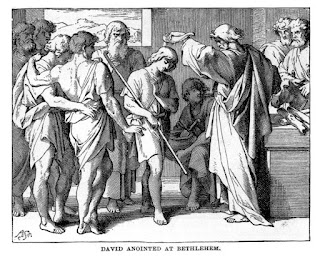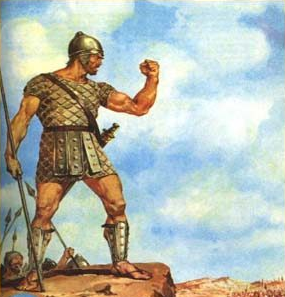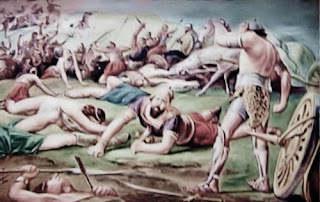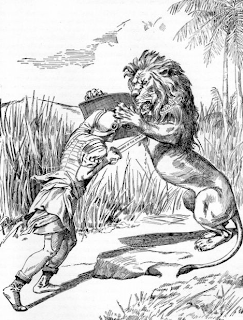 |
| "Triumph of David" by Matteo Rosselli |
TO CHEW ON: "Thus Saul saw and knew that the Lord was with David, and that Michal, Saul's daughter, loved him; and Saul was still more afraid of David. So Saul became David's enemy continually." 1 Samuel 18:28,29
Saul's admiration of David quickly turned to jealousy as the people expressed their preference for this youthful, brave, and spirited shepherd over him.
In a pretense of rewarding David, Saul tried to trap him with marriage to his daughters. But instead of getting killed in battle and later in the slaughter Philistines to obtain a gory dowry for Michal, David succeeded in not only defeating the enemy and delivering the dowry, but also in winning the love and loyalty of Saul's own daughter Michal. With each victory David endeared himself to the people more. Saul was right to fear him, for his successes were evidence of God's Spirit on him.
Saul's actions remind me of how we too sometimes fight the "Lord's anointed." When we gossip about our pastor or resist God-given leadership in other ways (grumble and complain, divide into factions, try to figure out ways to get rid of one or the other) aren't we engaging in a Saul-type battle—a battle we're sure to eventually lose?
I am reminded of Jesus' words to another Saul who was fighting the people God had anointed: "'Saul, Saul, why are you persecuting Me? .... I am Jesus whom you are persecuting. It is hard for you to kick against the goads'" Acts 9:4,5.
PRAYER: Dear God, help me to recognize those You have anointed for leadership in my life. Help me not to rebel against them, but to accept Your authority over me through them. Amen.
PSALM TO PRAY: Psalm 83
MORE: Pray for leaders
Instead of resisting God-given leadership, we could pray for our leaders. John Piper lists eight prayer points:
1. Ask God to give them an inclination to His word versus money, fame, or power.
2. Pray for their purity.
3. Pray for their biblical and doctrinal purity.
4. Pray for their solid, joyful, Christ-exalting marriages.
5. Pray for their boldness in witnessing.
6. Pray for visionary creative energy for them.
7. Pray for converting power, i.e. that the Lord will open hearts and save people through their ministry.
8. Pray that they would be a small part of a global spiritual awakening.
Read all of "How to Pray for the Pastoral Staff" - by John Piper. ©2012 Desiring God Foundation. Website: desiringGod.org.
*******************
Unless otherwise noted all Scripture quotations are taken from the New King James Version®. Copyright © 1982 by Thomas Nelson, Inc. Used by permission. All rights reserved.


















